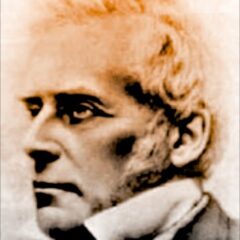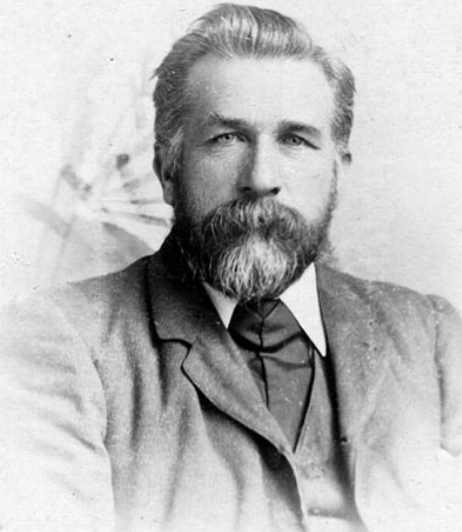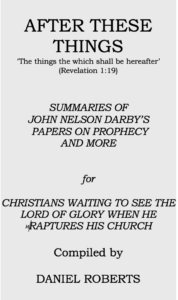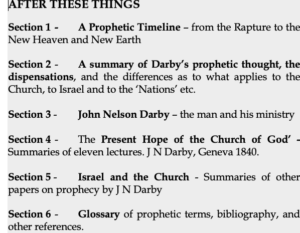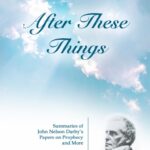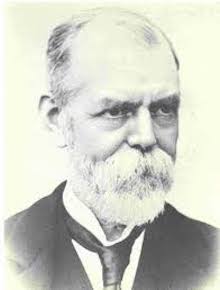Introduction
At a recent Zoom Bible reading, a young brother asked the question as to the difference between our soul and our spirit. We were reading 1 Thessalonians 5:23; ‘The very God of peace sanctify you wholly; and I pray God your whole spirit and soul and body’. To the shame of us older ones, we were not able to give a concise statement based on sound teaching. We could speak in general terms, quoting scriptures and the Holy Spirit helped. But this has caused me to look into the subject.
The following is largely from a paper by J N Darby ‘The Soul’ – Notes and Comments Volume 5 page 86. However, for the convenience of our readers, the scripture text has been added to the references. Other notes are from Strong’s Notes on Bible Hub.
John Nelson Darby’s notes
First, the word ψυχή/psuche/Strong 5590 is clearly used for ‘life,’ as
Matthew 2:20 the life of the little child
Matthew 10:39 he that loseth his life for my sake shall find it
Mark 3:4 on the sabbath days, or to do evil? to save life, or to kill?
Luke 9:24 For whosoever will save his life shall lose it
Luke 9:56 the Son of man is not come to destroy men’s lives, but to save them
John 12:25, He that loveth his life shall lose it;
and many other passages.
Conscious Feeling and Existence
Next, it is used for the general fact of conscious feeling and existence — the activity of the inner man — without defining whence or what it is. In this way, it is used even of God;
Matthew 12:18; my beloved, in whom my soul has found its delight – it goes on θήσω τὸ πνεῦμά μου ἐπ’ αὐτόν, I will put my spirit upon him
Hebrews 10:38. If any man draw back, my soul shall have no pleasure in him.
Matthew 22:37 With all thy heart, and with all thy soul
Mark 14:34 My soul is exceeding sorrowful
Luke 2:35. A sword shall pierce through thy own soul;
Persons
It is used for persons, as
Acts 2:41, here were added unto them about three thousand souls.
Acts 2:43 fear came upon every soul:
Acts 7:14, Jacob … all his kindred, threescore and fifteen souls.
Life, or in contrast to Body
But as ‘life’ and ‘soul,’ it is in contrast often, or ‘life’ is used for ‘the soul’ in its higher aspect. The same word is used of what is profited and lost in the same act.
Matthew 10:39 he that loseth his life (ψυχὴν/psychen) for my sake shall find it – compare with
Matthew 10:28 them which kill the body (σῶμα/soma/Strong 4983), but are not able to kill the soul (ψυχὴν/psyche)
Mark 8:35 or whosoever will save his life (ψυχὴν/psyche) shall lose it;
Mark 8:37– Or what shall a man give in exchange for his soul (ψυχῆς/psuches)? Similarly Luke 9:24-26, and John 12:25) and Luke 17:33
‘The soul’ used for the Responsible Part
We have then ‘the soul’ used generally for the responsible part, in which we live with God, whose state and movings are expressed in the body’s acts, as
Matthew 11:29; ye shall find rest unto your souls.
Matthew 16:26; gain the whole world, and lose his own soul? or what shall a man give in exchange for his soul?
Matthew 26:38; My soul is exceeding sorrowful, even unto death
Acts 14:22; Confirming the souls of the disciples, and exhorting them to continue in the faith
Acts 15:24; Certain which went out from us have troubled you with words, subverting your souls, saying, Ye must be circumcised,
perhaps Romans 2: 9; Tribulation and anguish, upon every soul of man that doeth evil,
2 Corinthians 1: 23; I call God for a record upon my soul, that to spare you I came not as yet unto Corinth.
Hebrews 6:19 Which hope we have as an anchor of the soul, both sure and stedfast,
Hebrews 10:39 we are not of them who draw back unto perdition; but of them that believe to the saving of the soul.
Hebrews 13:17 Obey them that have the rule over you, and submit yourselves: for they watch for your souls,
James 1:21; receive with meekness the engrafted word, which is able to save your souls.
James 5:20 he which converteth the sinner from the error of his way shall save a soul from death,
1 Peter 1:9, Receiving the end of your faith, even the salvation of your souls.
1 Peter 1:22, Seeing ye have purified your souls in obeying the truth through the Spirit
1 Peter 2:11 abstain from fleshly lusts, which war against the soul;
1 Peter 2:25 now returned unto the Shepherd and Bishop of your souls
1 Peter 4:19, suffer according to the will of God commit the keeping of their souls to him in well doing, as unto a faithful Creator.
2 Peter 2:8, For that righteous man dwelling among them, in seeing and hearing, vexed his righteous soul
2 Peter 2:14, Having eyes full of adultery, and that cannot cease from sin; beguiling unstable souls
3 John 2. thou mayest prosper and be in health, even as thy soul prospereth.
Here we find contrast with Jewish temporal deliverance.
Contrasted with Body
It is contrasted carefully with ‘body,’
Matthew 10:28 them which kill the body {σῶμα/soma/Strong 4983), but are not able to kill the soul (ψυχὴν/psyche)
Luke 12:20. (stronger because of verse 19); Soul, thou hast much goods laid up for many years…fool, this night thy soul shall be required of thee
Acts 2:27, Because thou wilt not leave my soul in hell, neither wilt thou suffer thine Holy One to see corruption.
Acts 2:31, he, seeing it before, spoke concerning the resurrection of the Christ, that neither has he been left in hades nor his flesh seen corruption. (Darby)
Acts 20:10 And Paul went down, and fell on him, and embracing him said, Trouble not yourselves; for his life (Acts 20:10 /psyche) is in him
compare 1 Kings 17:21, O LORD my God, I pray thee, let this child’s soul come into him again….and the soul of the child came into him again,
It is also distinguished as the mere living soul from the higher part in which it is in connection with God, through living in Him by the breath of life from Him;
1 Thessalonians 5:23; the very God of peace sanctify you wholly; and I pray God your whole spirit and soul and body
Hebrews 4:12. piercing even to the dividing asunder of soul and spirit, and of the joints and marrow, and is a discerner of the thoughts and intents of the heart.
Add to this Luke 16, the parable of the rich man and Lazarus. It is distinguished from the power of life in Christ in
1 Corinthians 15:45. The first man Adam was made a living soul; the last Adam was made a quickening spirit. Its distinct condition in man is originally founded on
Genesis 2:7 — God formed man of the dust of the ground, and breathed into his nostrils the breath of life; and man became a living soul. This is never said of beasts; hence
Acts 17:28. For in him we live, and move, and have our being; as certain also of your own poets have said, For we are also his offspring. – No reference to soul.
The ‘souls under the altar’ (Revelation 6:9) confirm this.
Strong’s Note
Strong’s Note
psuché: breath, the soul
Original Word: ψυχή, ῆς, ἡ
Part of Speech: Noun, Feminine
Transliteration: psuché
Phonetic Spelling: (psoo-khay’)
Definition: breath, the soul
Usage: (a) the vital breath, breath of life, (b) the human soul, (c) the soul as the seat of affections and will, (d) the self, (e) a human person, an individual.
Strongs’s HELPS Word-studies
5590 psyxḗ (from psyxō, “to breathe, blow” which is the root of the English words “psyche,” “psychology”) – soul (psyche); a person’s distinct identity (unique personhood), i.e. individual personality.
5590 (psyxē) corresponds exactly to the OT 5315 /phágō (“soul”). The soul is the direct aftermath of God breathing (blowing) His gift of life into a person, making them an ensouled being.
Strong’s Exhaustive Concordance
soul, life, self
From psucho; breath, i.e. (by implication) spirit, abstractly or concretely (the animal sentient principle only; thus distinguished on the one hand from pneuma, which is the rational and immortal soul; and on the other from zoe, which is mere vitality, even of plants: these terms thus exactly correspond respectively to the Hebrew nephesh, ruwach and chay) — heart (+ -ily), life, mind, soul, + us, + you.
See Thyler’s Greek Lexicon for a fuller analysis of this word
Used for the Higher Part
Second the word πνεῦμα/pneuma/Strong 4151 is clearly used for ‘spirit,’ as
‘Spirit’ is used often for the soul including the higher part. So even of Jesus,
.(Matthew 27:50 ‘He gave up the ghost’ (ἀφῆκεν τὸ πνεῦμα/aphēken to pneuma).
This word we must also examine.
It is used not uncommonly for the spiritual part of man in contrast with his body, as
Luke 8:55, ‘Her spirit came again,’
confirming the clear distinction between the two, as with soul. So where the two latter are also distinguished, spirit, soul, and body. But I think it has another force than ‘soul,’ though used in a general way like it, in contrast with ‘body,’ as the non-corporeal part of man. ‘Soul,’ as connecting itself with its action in the body, though clearly distinct, is more connected with life, and so used for it. ‘Spirit’ is more the active, intelligent consciousness, or the seat of that consciousness, which belongs to the inner man; and just what distinguishes man from the beast is that the latter has merely a living soul connected with an organism, passions, habits, faculties, such as memory, affections; while man has received this state of existence through God’s breathing into his nostrils the breath of life — by the spirit of life he became a living soul. Hence in ordinary language the two may be used as one; because of the pneuma zoes (the spirit of life) he has a ψυχὴν ζῶσαν/psychen zosan (a living soul). The mere animal has a ψυχὴν ζῶσαν/psychen zosan, but not through a divine πνεῦμα ζωῆς/pneuma zoes.
Active Intelligent Consciousness
The mere breath of natural life is organic, and has nothing to do with this. Hence ‘spirit’ is used for this active, intelligent, consciousness. In the Christian it is connected often with the Holy Spirit which dwells in him, as its activities are produced by it, not the soul. The Spirit and its fruit may thus also characterise the state of the soul. This character of the spirit of man, the connection of the term with active intelligent consciousness is frequently found;
Matthew 26:41 ‘The spirit indeed is willing’;
Mark 14:38, ‘Jesus perceived in his spirit;
Mark 8:12 ‘He sighed deeply in his spirit’
Luke 1:80, Luke 2:40 ‘Waxed strong in spirit;’
Luke 10:20, rejoice not, that the spirits are subject unto you;
Luke 23:46 , Father, into thy hands I commend my spirit:
John 4:24 God is a Spirit: and they that worship him must worship him in spirit and in truth.
John 13:21 When Jesus had thus said, he was troubled in spirit,
John 19:30 he said, It is finished: and he bowed his head, and gave up the ghost – KJV – spirit mostly elsewhere
chapter 19: 30, used in general, so
Acts 7:59 they stoned Stephen, calling upon God, and saying, Lord Jesus, receive my spirit.
Acts 17:16; while Paul waited for them at Athens, his spirit was stirred in him, when he saw the city wholly given to idolatry
Romans 1:9; For God is my witness, whom I serve with my spirit in the gospel of his Son,
Romans 12:11 Not slothful in business; fervent in spirit; serving the Lord;
1 Corinthians 2:11; Now we have received, not the spirit of the world, but the spirit which is of God
1 Corinthians 5:3 For I verily, as absent in body, but present in spirit…as though I were present,…In the name of our Lord Jesus Christ, when ye are gathered together, and my spirit,…deliver such an one unto Satan for the destruction of the flesh, that the spirit may be saved in the day of the Lord Jesus. (used in special manner for activity of the inner man and a power, not intelligent, thus contrasted with νοῦς/nous/Strong 3563 (the mind, the reason, the reasoning faculty, intellect, according to Strong) – proof of the difference of mere mind from the active principle, though usually acting, in the present state of human nature, in it as the present form of its power; so that consciousness, not mind, is essential to it);
1 Corinthians 14:2, 14, 15, etc. he that speaks with a tongue does not speak to men but to God: for no one hears; but in spirit he speaks mysteries. (Darby) …if I pray in an unknown tongue, my spirit prayeth…I will pray with the spirit, and I will pray with the understanding also: I will sing with the spirit, and I will sing with the understanding
2 Corinthians 2:13; I had no rest in my spirit, because I found not Titus my brother…the joy of Titus, because his spirit was refreshed by you all.
2 Corinthians 7:1; let us cleanse ourselves from all filthiness of the flesh and spirit, perfecting holiness in the fear of God. here through the mind,
Galatians 6:18; the grace of our Lord Jesus Christ be with your spirit. Amen
1 Thessalonians 5:23; I pray God your whole spirit and soul and body be preserved blameless unto the coming of our Lord Jesus Christ.
2 Timothy 4:22; The Lord Jesus Christ be with thy spirit. Grace be with you. Amen.
Hebrews 12:23. to God the Judge of all, and to the spirits of just men made perfect, (JND Note ‘Made perfect’ refers to ‘just men’ not ‘spirits’)
In Thessalonians and Hebrews, the contrast with body is clear, and in the former with soul also.
Strong’s Notes
pneuma: wind, spirit
Original Word: πνεῦμα, ατος, τό
Part of Speech: Noun, Neuter
Transliteration: pneuma
Phonetic Spelling: (pnyoo’-mah)
Definition: wind, spirit
Usage: wind, breath, spirit.
Strong’s HELPS Word-studies
4151 pneúma – properly, spirit (Spirit), wind, or breath. The most frequent meaning (translation) of 4151 (pneúma) in the NT is “spirit” (“Spirit“). Only the context however determines which sense(s) is meant.
[Any of the above renderings (spirit-Spirit, wind, breath) of 4151 (pneúma) is always theoretically possible (spirit, Spirit, wind, breath). But when the attributive adjective (“holy”) is used, it always refers to the Holy Spirit. “Spirit” (“spirit”) is by far the most common translation (application) of 4151 (pneúma).
The Hebrew counterpart (rûach) has the same range of meaning as 4151 (pneúma), i.e. it likewise can refer to spirit/Spirit, wind, or breath
Strong’s Exhaustive Concordance
spirit, ghost
From pneo; a current of air, i.e. Breath (blast) or a breeze; by analogy or figuratively, a spirit, i.e. (human) the rational soul, (by implication) vital principle, mental disposition, etc., or (superhuman) an angel, demon, or (divine) God, Christ’s spirit, the Holy Spirit — ghost, life, spirit(-ual, -ually), mind. Compare psuche.
See Thyler’s Greek Lexicon for a fuller analysis of this word
Like this:
Like Loading...

